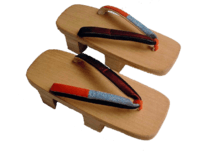Definify.com
Definition 2025
geta
geta
English

Geta
Noun
geta (plural getas or geta)
- A Japanese raised wooden clog, worn with traditional Japanese garments such as the kimono.
- 1982 July, Robert Dillon, Geta As A Karate Training Tool, Black Belt, page 70,
- The Japanese geta or wooden sandal is a superb, though little-utilized, tool for training in the martial arts. […] The geta are flat, wooden sandals raised on vertical slats.
- 1982 July, Robert Dillon, Geta As A Karate Training Tool, Black Belt, page 70,
Translations
Japanese raised wooden clogs
See also
Anagrams
Icelandic
Etymology
From Old Norse geta (whence also English get), from Proto-Germanic *getaną, from Proto-Indo-European *gʰed- (“take, seize”). Compare Danish gide, Swedish gitta.
Pronunciation
- IPA(key): /ˈcɛːta/ ()
- Rhymes: -ɛːta
Verb
geta (strong verb, third-person singular past indicative gat, third-person plural past indicative gátum, supine getið)
Conjugation
geta — active voice (germynd)
| infinitive (nafnháttur) |
að geta | ||||
|---|---|---|---|---|---|
| supine (sagnbót) |
getið | ||||
| present participle (lýsingarháttur nútíðar) |
getandi | ||||
| indicative (framsöguháttur) |
subjunctive (viðtengingarháttur) |
||||
| present (nútíð) |
ég get | við getum | present (nútíð) |
ég geti | við getum |
| þú getur | þið getið | þú getir | þið getið | ||
| hann, hún, það getur | þeir, þær, þau geta | hann, hún, það geti | þeir, þær, þau geti | ||
| past (þátíð) |
ég gat | við gátum | past (þátíð) |
ég gæti | við gætum |
| þú gast | þið gátuð | þú gætir | þið gætuð | ||
| hann, hún, það gat | þeir, þær, þau gátu | hann, hún, það gæti | þeir, þær, þau gætu | ||
| imperative (boðháttur) |
get (þú) | getið (þið) | |||
| Forms with appended personal pronoun | |||||
| gettu | getiði * | ||||
| * Spoken form, usually not written; in writing, the unappended plural form (optionally followed by the full pronoun) is preferred. | |||||
| infinitive (nafnháttur) |
að getast | ||||
|---|---|---|---|---|---|
| supine (sagnbót) |
getist | ||||
| present participle (lýsingarháttur nútíðar) |
getandist ** ** the mediopassive present participle is extremely rare and normally not used; it is never used attributively or predicatively, only for explicatory subclauses |
||||
| indicative (framsöguháttur) |
subjunctive (viðtengingarháttur) |
||||
| present (nútíð) |
ég gest | við getumst | present (nútíð) |
ég getist | við getumst |
| þú gest | þið getist | þú getist | þið getist | ||
| hann, hún, það gest | þeir, þær, þau getast | hann, hún, það getist | þeir, þær, þau getist | ||
| past (þátíð) |
ég gast | við gátumst | past (þátíð) |
ég gætist | við gætumst |
| þú gast | þið gátust | þú gætist | þið gætust | ||
| hann, hún, það gast | þeir, þær, þau gátust | hann, hún, það gætist | þeir, þær, þau gætust | ||
| imperative (boðháttur) |
gest (þú) | getist (þið) | |||
| Forms with appended personal pronoun | |||||
| gestu | getisti * | ||||
| * Spoken form, usually not written; in writing, the unappended plural form (optionally followed by the full pronoun) is preferred. | |||||
getinn — past participle (lýsingarháttur þátíðar)
| strong declension (sterk beyging) |
singular (eintala) | plural (fleirtala) | |||||
|---|---|---|---|---|---|---|---|
| masculine (karlkyn) |
feminine (kvenkyn) |
neuter (hvorugkyn) |
masculine (karlkyn) |
feminine (kvenkyn) |
neuter (hvorugkyn) |
||
| nominative (nefnifall) |
getinn | getin | getið | getnir | getnar | getin | |
| accusative (þolfall) |
getinn | getna | getið | getna | getnar | getin | |
| dative (þágufall) |
getnum | getinni | getnu | getnum | getnum | getnum | |
| genitive (eignarfall) |
getins | getinnar | getins | getinna | getinna | getinna | |
| weak declension (veik beyging) |
singular (eintala) | plural (fleirtala) | |||||
| masculine (karlkyn) |
feminine (kvenkyn) |
neuter (hvorugkyn) |
masculine (karlkyn) |
feminine (kvenkyn) |
neuter (hvorugkyn) |
||
| nominative (nefnifall) |
getni | getna | getna | getnu | getnu | getnu | |
| accusative (þolfall) |
getna | getnu | getna | getnu | getnu | getnu | |
| dative (þágufall) |
getna | getnu | getna | getnu | getnu | getnu | |
| genitive (eignarfall) |
getna | getnu | getna | getnu | getnu | getnu | |
Usage notes
- Geta exceptionally requires the supine (sagnbót) form of an accompanying verb, rather than the bare infinitive.
Derived terms
See also
Noun
geta f (genitive singular getu, nominative plural getur)
Declension
declension of geta